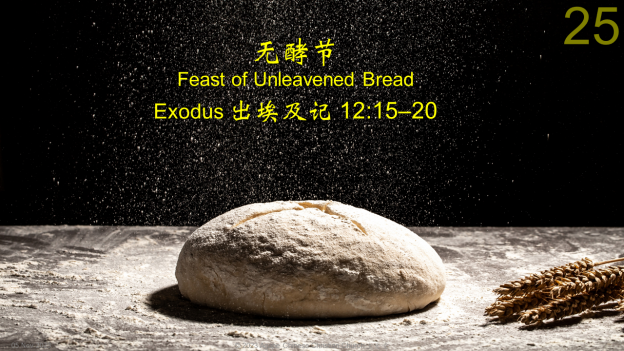无酵节 Feast of Unleavened Bread
Remember these points
I put these points at the top of my sermon-prep template to remind myself every week:
- Show that main point of passage relates to Jesus and his saving work
- (1 Cor 1:18) A truly gospel-centred message will not be acceptable in a synagogue or mosque
- Did I proclaim the gospel as the headline news of the sermon, rather than as a “by the way…”?
- Unbelievers are called to repent, believe, and be saved
- Believers are encouraged to abandon their old self, renew their minds, put on the new self in Christ
- Preach simple sermons, so that God’s people can see Christ more clearly and love him more dearly
News

Clarifications

We want to make two clarifications (澄清) today.
Clarification 1 第一个逾越节是特别的 First Passover was special

In Exo 12:1, it mentioned “in the land of Egypt.” We understand this to mean that the instructions for the first Passover, celebrated in Egypt, was specific only to this first Passover. After they left Egypt, they still celebrate the Passover, but it’s not done exactly the same way.
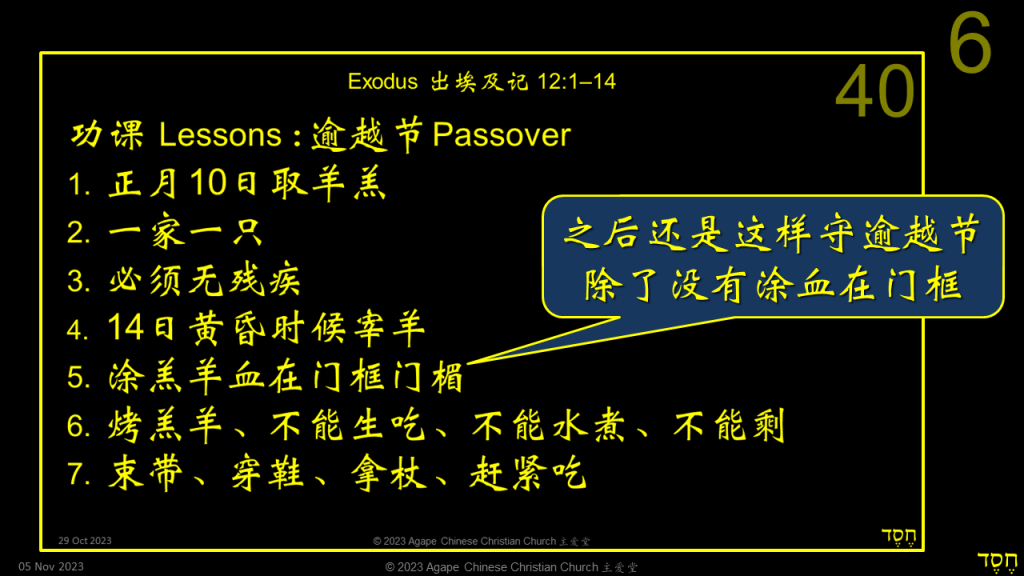
功课 Lessons: 逾越节 Passover
- 正月10日取羊羔
Select the lamb on 10th of 1st month - 一家一只
One lamb per family - 必须无残疾
Must not be injured or deformed - 14日黄昏时候宰
Slaughter lamb at twilight - 涂羔羊血在门框门楣
Paint lamb’s blood on doorframe and lintel - 烤羔羊、不能生吃、不能水煮、不能剩
Roasted, not raw, not boiled, no leftover - 束带、穿鞋、拿杖、赶紧吃
Put on belt, wear shoes, take staff, eat quickly
Above is slide #40 from last week’s sermon (231029). Step #5, when they had to smear the lamb’s blood on the door frame, is not followed in subsequent Passover celebrations. This is because they only had to commemorate what YHWH did during that first Passover night; after that first Passover, YHWH will no longer come at midnight to kill their firstborn.
Clarification 2 中保的意思 Meaning of mediator
We’ll look at 2 pictures of disputes between two groups or two people.

The picture is what things might look like tomorrow (6 Nov 2023), when 400,000 public sector workers in Quebec will go on strike.
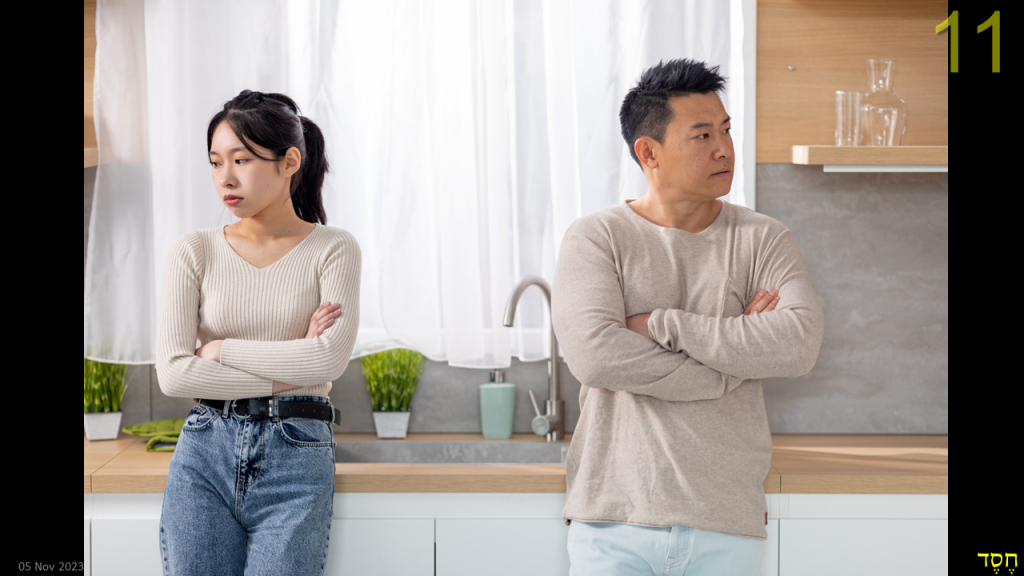
Picture shows a couple fighting.
How are these disputes usually handled?
With union disputes, the government will usually appoint a mediator, someone who is impartial and stands between the government and the unions.
With couples fighting, things are actually not so different!
When the couple can’t resolve the dispute between themselves, they’ll usually find someone to be the go-between, someone whom both trusts, and will help them resolve the dispute.
Today, we’ll look at the meaning of “mediator.”
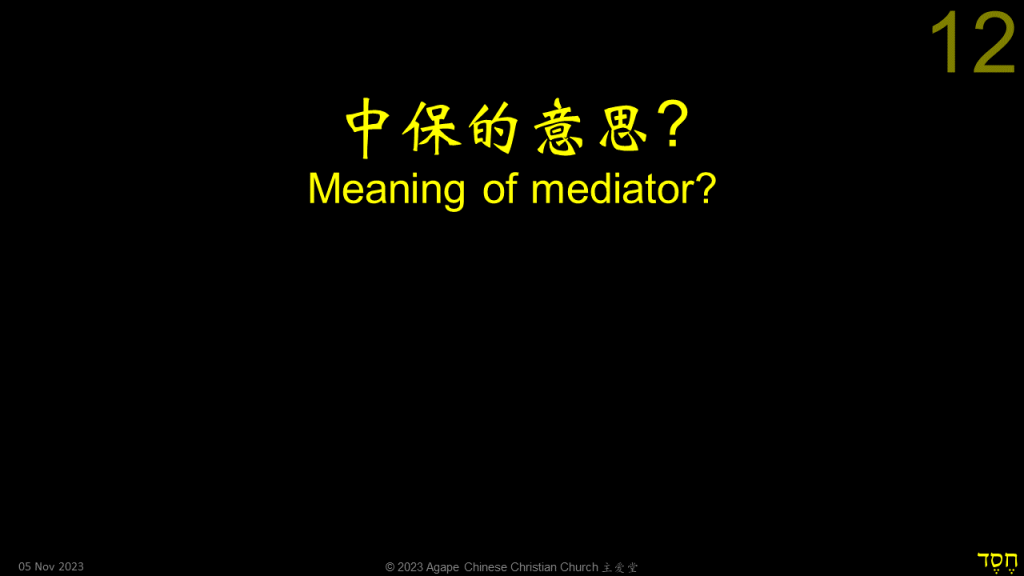
What’s the usual meaning of mediator?
- A go-between, someone who handles dispute between two parties.
- Someone who negotiates on behalf of two parties.
- Someone who attempts to make people involved in a conflict to come to an agreement. Usually, both sides compromise a little on their demands, until an agreement is reached.
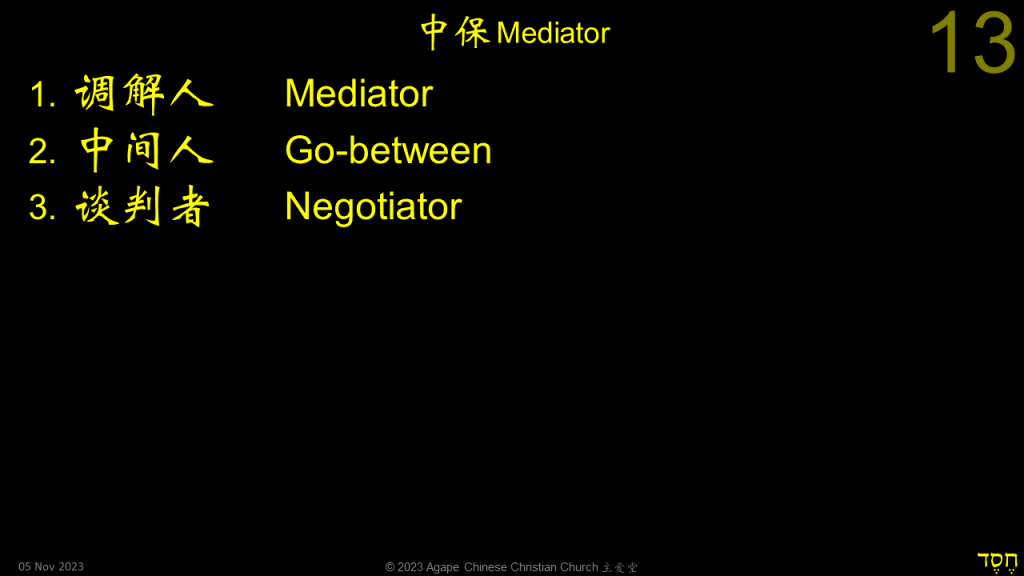
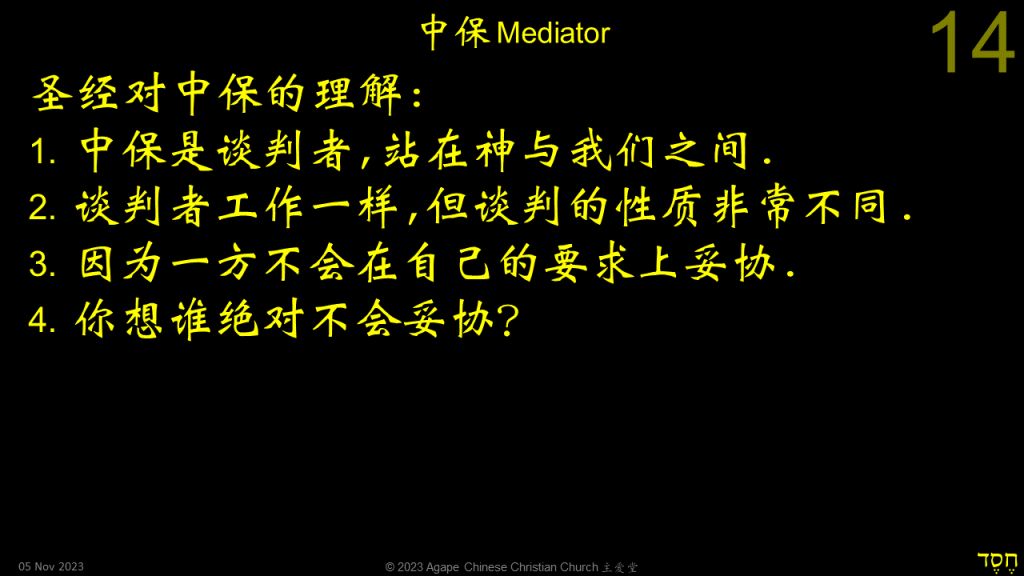
The biblical understanding of “mediator” is more or less how the word is usually understood. However, the nature of the negotiations is very different.
In the usual negotiation (e.g., between a union and the government, or between a fighting couple), both sides have demands, and both sides will usually change their demands in order to move forward with settling the dispute (union asks for more pay, government won’t do it, but will give the unions more holidays and sick leave, etc.)
In the Bible, one side never compromises on the requirements.
Who do you think won’t compromise?
In the Bible, “mediator” appears 6x in the NT, and it always refers to the person who stands between God and us.
Name some mediators in the OT and NT
OT:
- Moses (the most important mediator in the OT), mediating between Pharaoh and God, then later between the Israelites and God.
- The judges, prophets, kings, priests.
NT:
- Jesus. Similar to Moses, Jesus is the mediator of the new covenant (Moses, of course, is the mediator of the old covenant).
The usual meaning of mediator gives us a false understanding of our relationship with God. We think that God gives up a little, we give up a little, and the mediator brings us to agreement. NO!
The Bible tells us God’s way is the only way. We’ve already seen time and again that Pharaoh always tries to negotiate with Moses (the mediator between God and Pharaoh), but every time, Moses tells Pharaoh the exact same demands.
God’s requirements never change. It’s us who need to change.

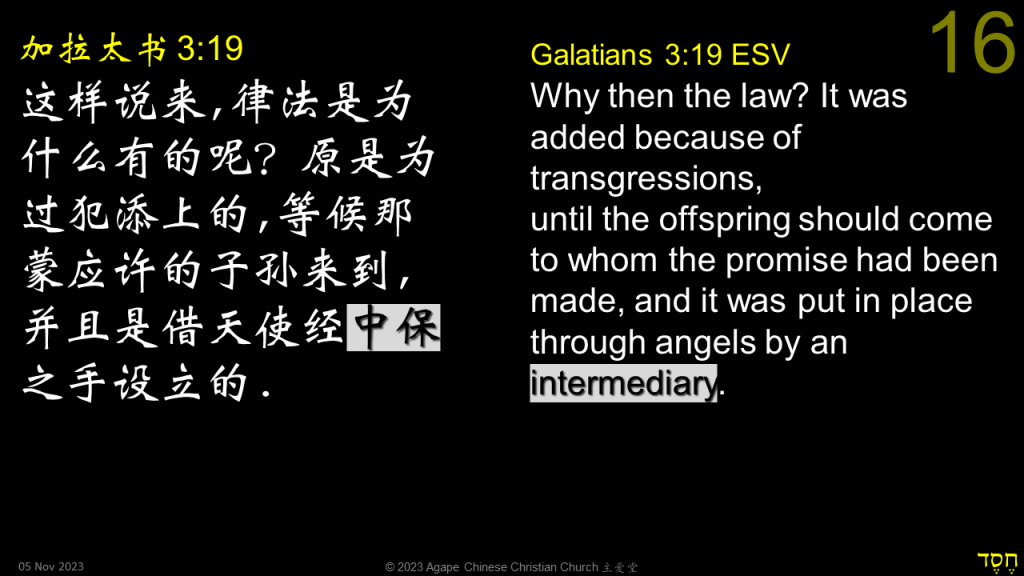
加拉太书 3:19
这样说来,律法是为
什么有的呢?原是为
过犯 添上的,等候那
蒙应许的子孙来到,
并且是借天使经中保
之手设立的.
Paul is writing to the Galatian church about why the law in the OT was given. The law was put in place through angels by an intermediary (mediator). Thus, the law isn’t as good as the promise to Abraham, because with Abraham, God gave the promise directly, no angels in between.

希伯来书 8:6
如今耶稣所得的职任是
更美的,正如他作
更美之约的中保;
这约原是凭更美之
应许立的.
Christ is superior to Moses because Christ mediates a better covenant, with better promises.
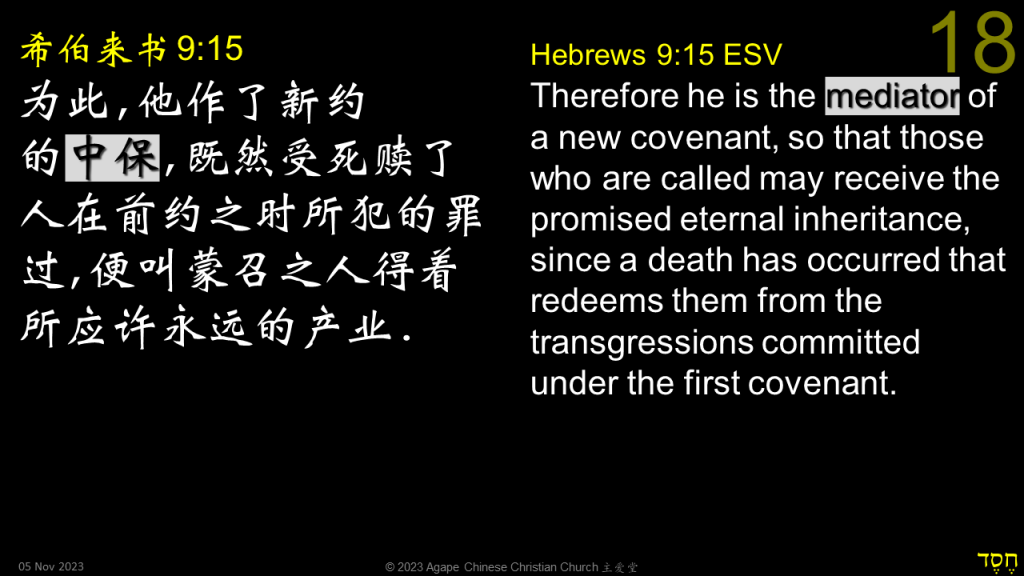
Christ is the mediator of the new covenant. His death redeemed us from our sins (we can’t satisfy the requirements of the first covenant, the Law).
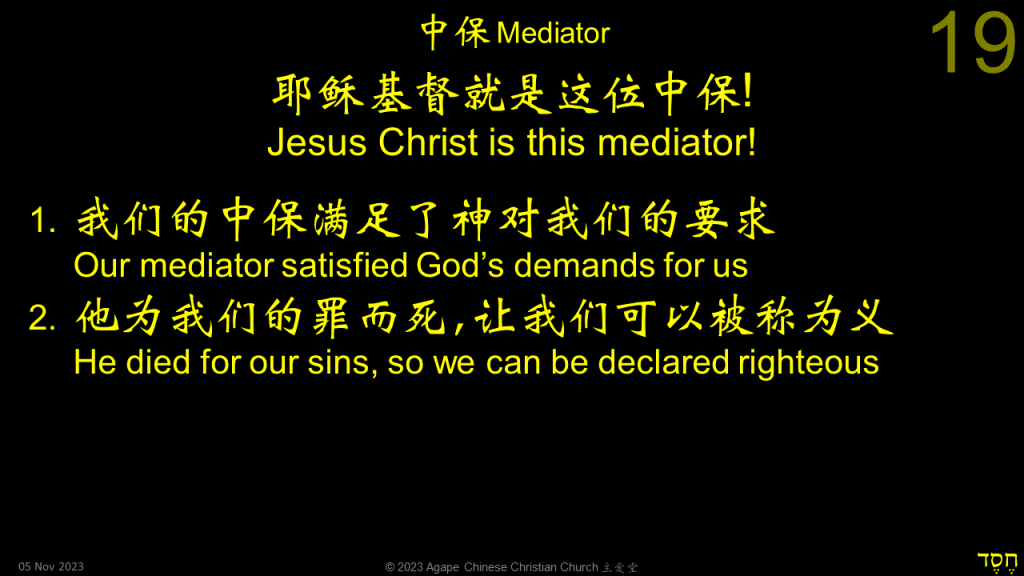
Hook

How much do you know about the Feast of Unleavened Bread?
- A week-long festival that starts the day after Passover (Passover is on 14 Nisan, so Unleavened Bread starts on 15 Nisan).
- First instituted just before they left Egypt (Exo 12:15–20).
- Still celebrated by Jews today.
- They are to rid their homes of leaven (yeast) before the Passover begins.
- For the entire week, they cannot eat anything with leaven, or have any leaven in the house.
- Eating any leaven during this period will result in being cut off from Israel (the covenant community).
- During that whole week, they can’t do any work, other than preparing meals.
Passage
The pictures show the passage in English, with the corresponding Chinese text shown below so you can follow along.
As you read the passage, what do you observe? Does the writing seem kind of awkward?
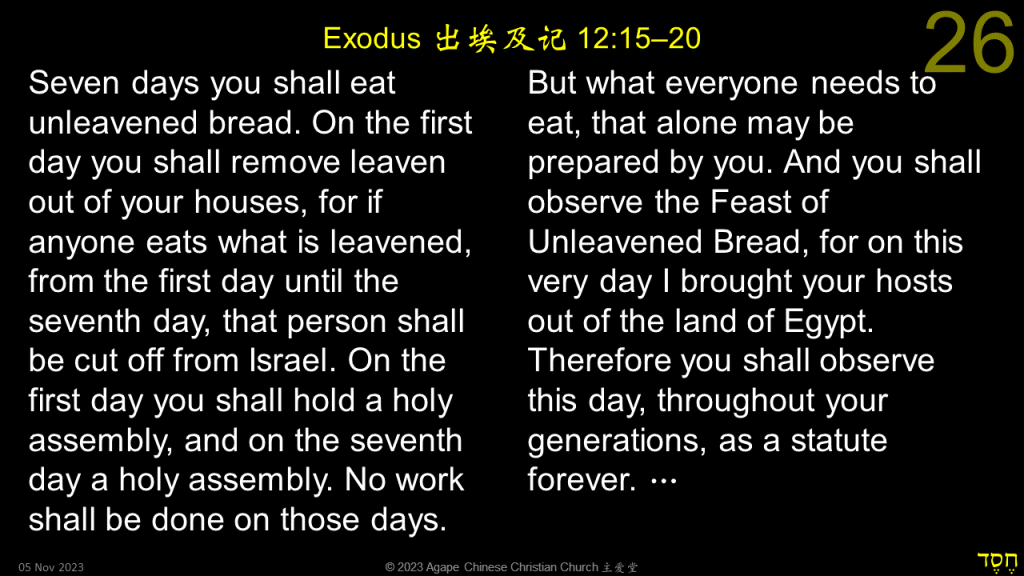
你们要吃无酵饼七日.
头一日要把酵从你们各
家中除去;因为从头一
日起,到第七日为止,凡
吃有酵之饼的,必从以
色列中剪除.头一日你
们当有圣会,第七日也
当有圣会.这两日之内,
除了预备各人所要吃的
以外,无论何工都不可
做.你们要守无酵节,因
为我正当这日把你们的
军队从埃及地领出来.
所以,你们要守这日,作
为世世代代永远的定例. …

…从正月十四日晚上,
直到二十一日晚上,你
们要吃无酵饼.在你们
各家中,七日之内不可
有酵;因为凡吃有酵之
物的,无论是寄居的,是
本地的,必从以色列的
会中剪除.有酵的物,你
们都不可吃;在你们一
切住处要吃无酵饼.」
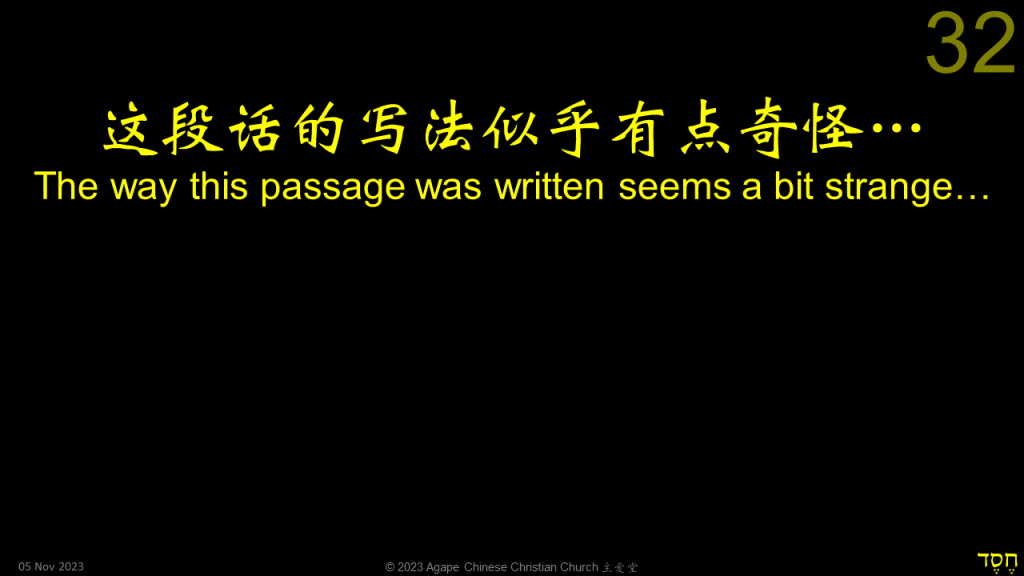
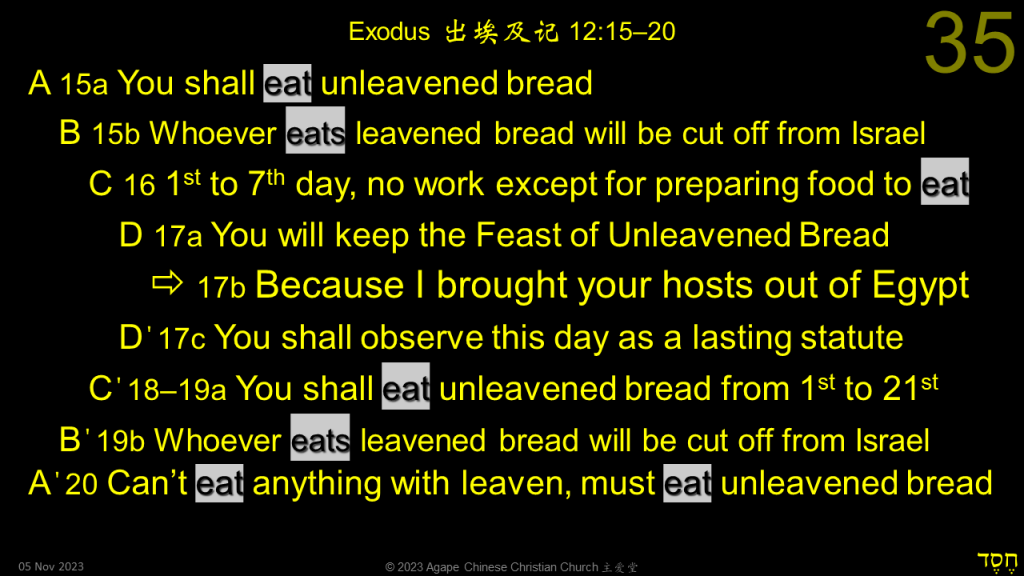
Exo 12:15–20 has a special structure called a chiastic structure. In this ABCDXD’C’B’A’ style of writing, the centre item is usually the key point or most important item in the passage.
This is why today’s passage starts at v.15. Many Bibles and commentaries group v. 14 with 15–20, and this will break the chiastic structure.
You can also see that the verb “to eat” appears 7x in today’s passage, just like the 7x in last week’s passage (Exo 12:1–14).
Outline
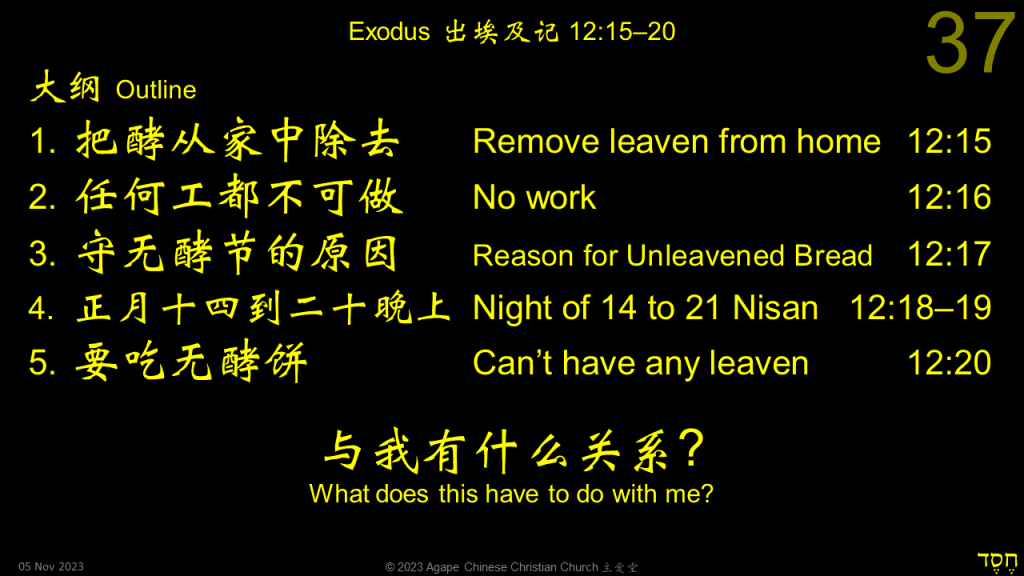
Section 1 把酵从家中除去 Remove leaven from home
Passage
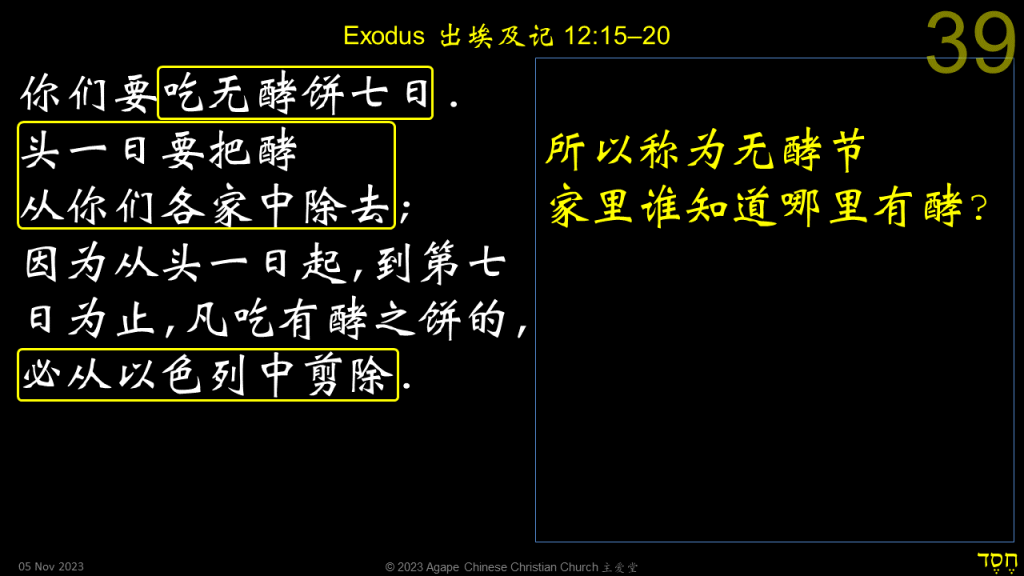
Section 2 任何工都不可做 No work
Passage
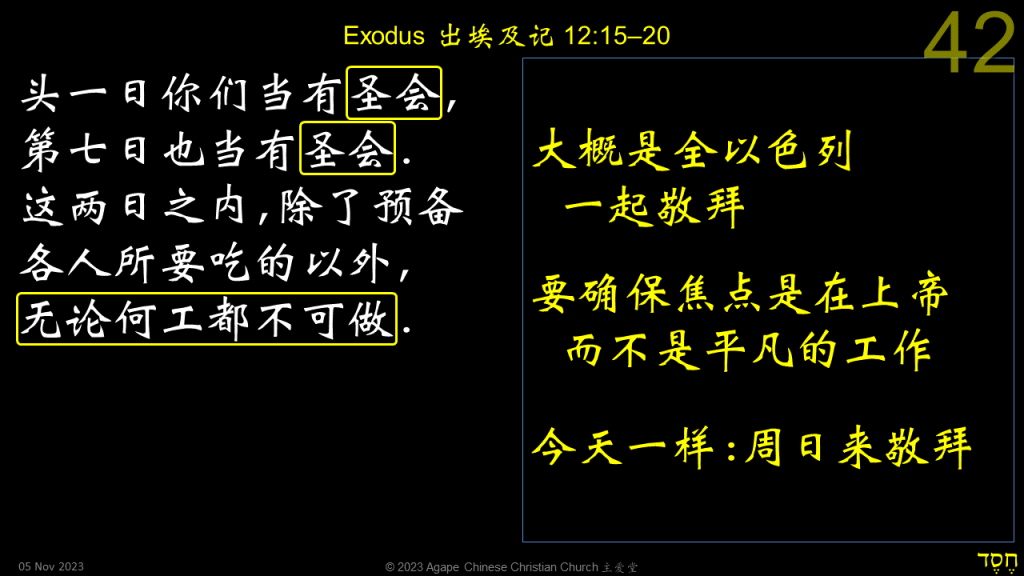
“Holy Convocation” is probably some sort of worship ceremony that the entire nation participate in.
We do the same today: we get together every Sunday to worship.
Section 3 守无酵节的原因 The reason for Festival of Unleavened Bread
Passage

This is the focus of today’s passage: to commemorate the day YHWH led them out of Egypt.
Section 4 正月十四日到二十晚上 Night of 14–21 Nisan
Passage
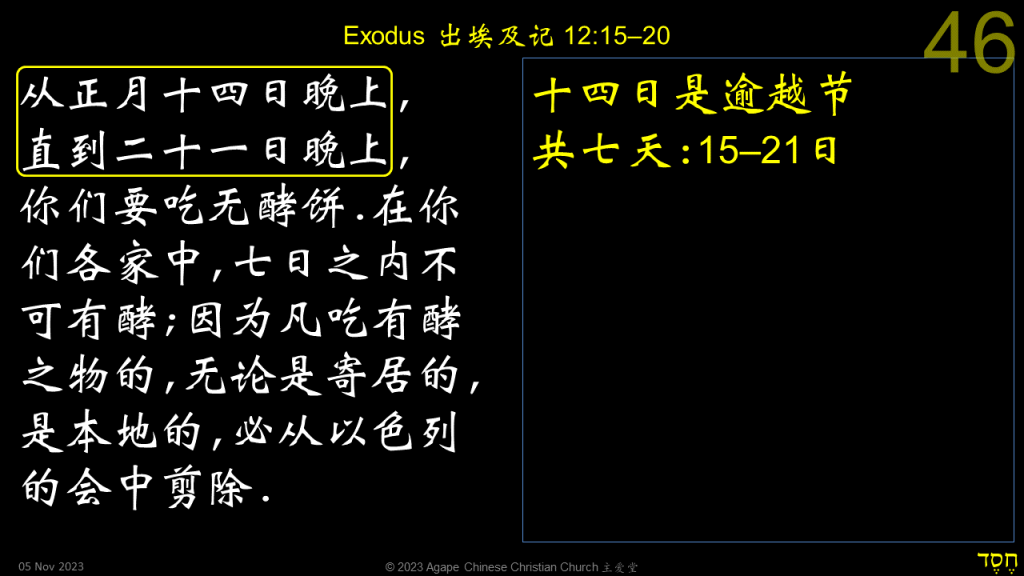
Unleavened Bread lasts 7 days, from 15 to 21 Nisan. 14 Nisan is Passover.
Section 5 要吃无酵饼 No leavened food
Passage

They have to remove all leaven from the home, and can’t eat (for a whole week) anything with leaven.
The ending quote here ends the long speech from YHWH to Moses and Aaron (starts in 12:2).
Lessons

Summarise today’s passage:
- Feast of Unleavened Bread lasts 7 days, from 15–21 of the first month (15–21 Nisan).
- On the 1st, must remove all leaven from the house.
- Except for perparation of meals, no other work can be done during the week.
- The reason for the feast is because on that day (15 Nisan), YHWH led them out of Egypt.
- During the week, they can’t eat anything with leaven.
- This is a perpetual ordinance to be kept every year.
- Passover and Unleavened Bread are often used interchangeably. You see this often in the NT, when they refer to the entire week as either Passover or Unleavened Bread.
与我有什么关系? So what?
I renamed this Section from “Final Lessons” to “So what?” The idea is still the same: How does today’s passage apply to our lives today? When I go back to school or work, how will I change my life to be more in line with what the Lord expects of us?
You can also follow this with the diagram I made to help me get things clear as I was preparing all this: follow the diagram here.

What does this have to do with me:
- Last Sunday: Passover
- This Sunday: Feast of Unleavened Bread
- Today: Lord’s Supper

Passover (12:1–14)
- Not just Egyptians are in danger, Israelites also are in danger.
- Not just to force Pharaoh to release them, but the ultimate reason is redemption.
- Passover is a preview of salvation, it previews the ultimate Passover lamb Jesus Christ.
- Jesus died for us, so that we can become children of God.

Unleavened Bread (12:15–20)
- Remove all leaven.
- What does leaven represent? Sin!
- This previews us removing sin from our homes (our bodies, our minds).
- We need to make a break with the past. After salvation, we need to remove all leaven.
- What is this process called? Sanctification!
- Have we removed leaven from our lives?
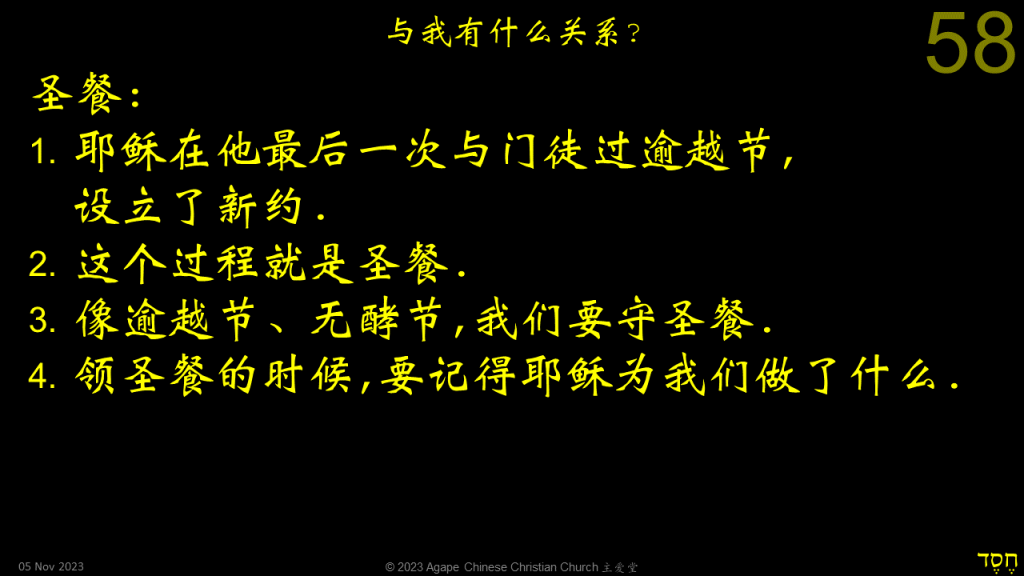
Lord’s Supper:
- During the final Passover meal with his disciples, Jesus established the new covenant.
- This entire process is the Lord’s Supper (or Communion).
- Like Passover and Unleavened Bread, we are to keep the Lord’s Supper continually.
- When we take the Communion, we have to remember what Jesus did for us.

